Screenshots of the Rolls Royce app and the promotion for a private audience with Pope Francis. Screenshots
Need to know: Friday, March 6, 2020

Rolls-Royce promotes exclusive Mass with pope — for $155,000
Buyers are also encouraged to donate at least $112,000 to the Catholic Church.
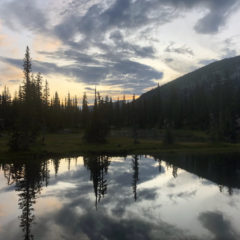
Doomsday preppers put faith in God and plan for the end of all things
Faith-based preppers say they'll be ready when the end of the world comes — whether by coronavirus, nuclear weapons or some other catastrophe.

New NAE president calls for evangelicals to address ‘identity crisis’ without fear
Evangelicals are ‘compelled to transform by God’s grace our national narrative of racism into the gospel narrative of reconciliation,’ said the Rev. Walter Kim in his inaugural address.
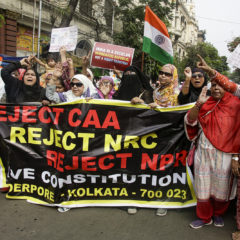
Citizenship laws threaten India’s Muslims, hurt minorities elsewhere, panel says
‘The fear of losing citizenship is genuine,’ said Aman Wadud, who defends accused illegal migrants and detainees in the northeastern state of Assam.
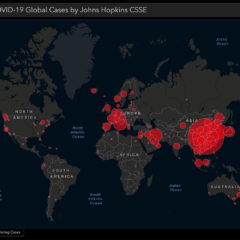
Prepping for the coronavirus the Mormon way
I love my church’s consistent, and decidedly unglamorous, emphasis on preparing for emergencies. Mormons are famous for this stuff, writes Jana Riess.
N.Y. attorney general to televangelist Jim Bakker: Stop peddling unproven coronavirus cures
The Rev. Jim Bakker, televangelist and salesman, has long promoted “Silver Solution” — a scientifically dubious medication made from the precious metal — to cure all sorts of ailments.
Latest news from RNS
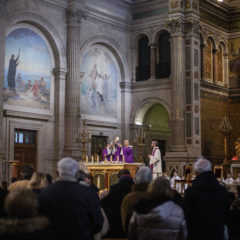
Worries over virus prompt changes in many worship services
A rising number of churches across the United States are making changes in response to the coronavirus outbreak.
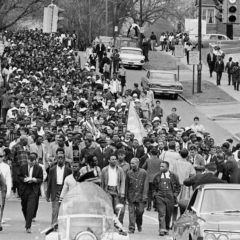
Civil rights: The road to Bloody Sunday began 30 miles away
MARION, Ala. (AP) — Della Simpson Maynor remembers the mounted police officer cracking her elbow with a baton. She recalls the panicked marchers unable to escape the onslaught, and the scuffle between officers and a young church deacon who was trying to protect his mother and grandfather. Most of all, she remembers the gunshot.
Two weeks before Bloody Sunday — the clash in Selma on March 7, 1965, that helped propel passage of the Voting Rights Act of 1965 — there was a march in this small town 30 miles away.
What happened in Marion is now a less-familiar episode in the civil rights movement, a footnote in the textbooks. But the blood spilled here would send hundreds of people from Marion and the surrounding county to Selma and the Edmund Pettus Bridge, where history was made.
"Starting the story in Selma is like reading a book by starting in the middle and not going back to the beginning so you can get the total picture of what actually happened in 1965," said Perry County Commissioner Alfred Turner Jr. "Without the events occurring in Marion, there's no way you would have gotten the same results or the optics of Bloody Sunday."
The protest in Marion was sparked by the arrest of a minister who was leading efforts to register black people to vote. It ended with the fatal shooting of a 26-year-old black church deacon, Jimmie Lee Jackson, by a state trooper.
As the 55th anniversary of Bloody Sunday approaches, people here say they want the full story remembered.
The road to Marion, and eventually to Selma, began at the White House months before.
The Rev. Martin Luther King, his lieutenant Andrew Young and other activists sat down with President Lyndon Johnson after passage of the Civil Rights Act of 1964. Johnson "told Dr. King, `I know you need voting rights. I wish I could do it, but I just don't have the power,'" Young recalled, adding Johnson seemed depressed.
When they left, King said, "We've got to figure out how to get the president some power," according to Young, who would go on to become a congressman, Atlanta mayor and U.N. ambassador. "I said, `That Nobel Prize you won didn't come with an army.'"
King's Southern Christian Leadership Conference chose to throw its support behind the Student Non-Violent Coordinating Committee and local groups that had been focusing on voter registration in Alabama, where they were holding protests, sit-ins and boycotts.
The Rev. James Orange of the SCLC organized protests in Marion and Perry County, and hundreds of people were regularly arrested and jailed. When students began skipping school to join the marches, authorities arrested Orange on Feb. 18, 1965, for contributing to the delinquency of minors.
Former Perry County Circuit Clerk Mary Moore, a second-grader at the time, said the arrest was hypocritical on the part of the white authorities, noting that black students back then often missed school because farmers needed them to pick cotton.
Rumors circulated that Orange would be lynched behind bars. That was by no means a far-fetched fear.
"Black folks in jail ended up dead. That's the way it was then," said 83-year-old Elijah Rollins, then owner of one the town's funeral homes. "It was just tradition."
Townspeople planned a night protest march from Zion Methodist Church to the jail on the next block. State and local police were waiting for them outside, where the streetlight was either shot out or turned off. With darkness came chaos.
Rollins had skipped the church meeting but heard the commotion, and when he went outside, "a lot of people were getting the hell beat out of them."
Maynor, then 14, watched as a pastor started off the protest by kneeling to pray, as was customary. Police officers told him to get up and clubbed him when he didn't, she said.
"When I saw that, I was terrified," she recalled. Seconds later she was hit as she raised her arm to protect her head. An officer on horseback "was whaling down on me."
"They didn't know what your age was. They didn't care. They swung at everybody," she said.
Somewhere in the melee, Cager Lee, 82, and his daughter Viola Jackson were attacked by police. Lee's grandson, Jimmie Lee Jackson, came to help them and grappled with officers inside a local hangout, Macks Cafe.
"A few minutes later you heard the gunshot," Maynor said.
Jackson had a stomach wound and was taken to the black hospital in Selma, where he died eight days later. Rollins, who heard him screaming in pain two days before, picked up the body.
SCLC and local leaders began talking almost immediately about taking his body from Marion to Alabama's capital, Montgomery, but that idea was abandoned. They decided to lay Jackson to rest at a Marion-area cemetery at a funeral attended by King himself, and later march to the capital from Selma, a more logical staging point.
"We will take this problem to Montgomery and leave it on Wallace's doorstep," King told Young, referring to Alabama's arch-segregationist governor, George Wallace.
Plans were made for the 54-mile march from Selma to Montgomery, but on the day chosen, King was back home in Atlanta, and the federal observers who normally shadowed him and presumably would have served as a deterrent against violence weren't there when hundreds of marchers with backpacks gathered at the bridge.
State troopers and local police were waiting for them and attacked with clubs and tear gas.
A terrified Terrance Chestnut, 6 at the time, was there with his father, Selma civil rights attorney J.L. Chestnut Jr.
"I saw a cop hit a guy across the jaw with a billy club. I could hear the crack," he said. "It was a really bad scene, something I don't care to remember but something I can't erase from my mind. "
The TV footage and other images from that day shocked the country and helped lead to the landmark federal law protecting the right of African Americans to vote.
The Marion marchers would not recognize the community leadership now.
The state trooper who shot Jackson, James Bonard Fowler, was prosecuted decades later by Perry County's first black district attorney. Fowler pleaded guilty in 2010 to manslaughter and served five months in jail. The mayor, police chief, sheriff and numerous other public officials in Marion and Perry County also are African American.
A marble monument to the civil rights movement has been erected in front of Zion Methodist with the names of the people who participated in those protests. The county jail where Orange was held is closed, but there are plans to turn it into a museum. On the courthouse square is another monument, telling Jackson's story and adding Marion to the Selma to Montgomery National Historic Trail. It was put up in 2015.
In a letter to the Department of Interior supporting Marion's inclusion, Rep. Terri Sewell of Alabama cited the role Jackson's death played in the Selma march, saying that nearly 300 of the more than 500 people who participated on Bloody Sunday were from Marion.
"They paved the way and gave the push to change the world," said Marion Mayor Dexter Hinton.
In the years afterward, Jackson's mother "was never right again after Jimmie was killed," said his cousin Fairest Cureton, 63.
"Jimmie was one of the nicest, most mannerable persons that I knew. He always had a smile on his face," said another cousin, 76-year-old Julia Cash, "and what was most impressive is he always took time for older people."
In fact, according to his family, Jackson was too sick to come to the church meeting that night in Marion but drove his grandfather and mother there and was waiting to take them home.
As for Orange, he went on take part in the Bloody Sunday march and spent his life fighting for civil rights and others causes, believing in "this thing called equality," said his daughter, Jamida Orange. He died in 2008.
"If anybody tells you it was anything but the death of Jimmie Lee Jackson that provoked that Selma-to-Montgomery march," she said, "they are doing a revisionist history."
___
Associated Press researchers Rhonda Shafner and Randy Herschaft in New York contributed to this report.
___
Associated Press religion coverage receives support from the Lilly Endowment through the Religion News Foundation. The AP is solely responsible for this content.
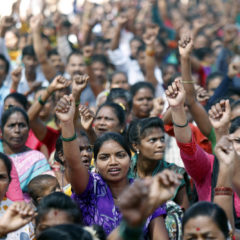
Albany becomes third city to condemn India’s citizenship laws
The capital of New York state has passed the United States' third resolution denouncing the far-right Indian government’s changes to citizenship laws that allege anti-Muslim bias.
More views from RNS
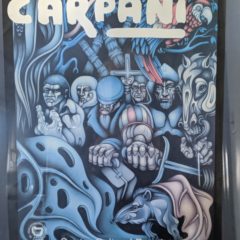
Pope Francis in the jungle
When it comes to the Amazon, he's got a plan for dealing with capitalism, but not for addressing the priest shortage, writes Mark Silk.
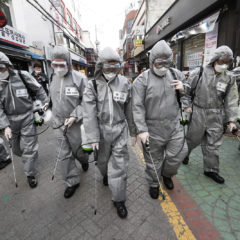
How we respond to coronavirus outbreaks may depend on what we want from religion
(RNS) — Now is the time to faithfully prepare while rejecting fear-driven panic, stigmatization and prejudice.
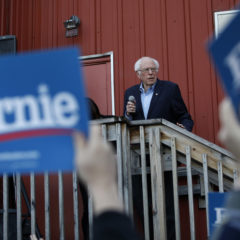
Democrats ignore Catholic voters at their own peril
With Catholics almost evenly split between Republicans and Democrats, they may be the key to those prized swing states that can determine the outcome in November, writes Thomas Reese.







